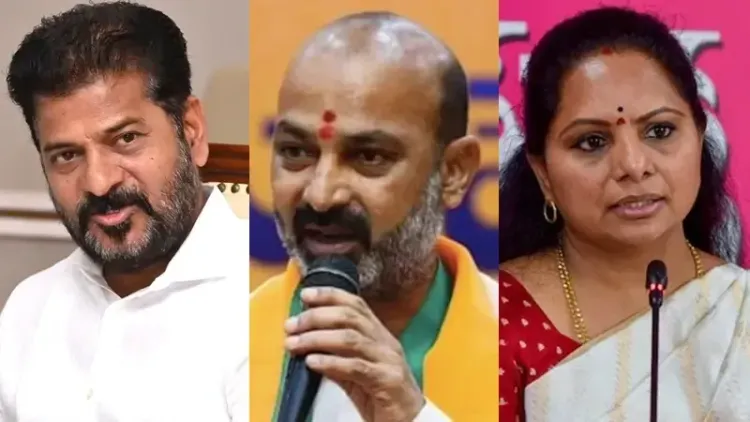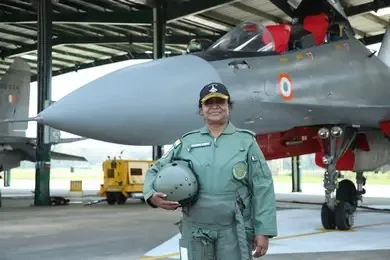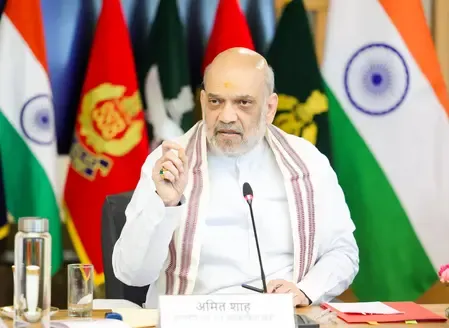Political Tensions Rise in Telangana Over BC Reservation

Synopsis
Key Takeaways
- Congress plans to increase BC reservation to 42%.
- The bill may surpass the 50% reservation cap.
- BJP opposes including Muslims in BCs.
- Political analysts foresee conflict among the three parties.
- Enhanced reservations could elevate overall quotas to 66-67%.
Hyderabad, Feb 16 (NationPress) Political tensions are escalating in Telangana concerning the reservation issue as the Congress government prepares to introduce a bill in the State Legislature next month aimed at increasing the reservation for Backward Classes (BCs) to 42 per cent, fulfilling a commitment made during the 2023 Assembly elections.
This proposed adjustment would push total reservations significantly beyond the Supreme Court cap of 50 per cent. In response, the Congress party intends to present the bill to the Centre for approval, thus placing the responsibility on them.
By doing so, the Congress aims to challenge the BJP to demonstrate its dedication to BC welfare by advocating for a Constitutional amendment that would permit the state to extend overall reservations beyond the 50 per cent limit.
The ruling party seeks to achieve a dual objective with this bill, as it will also serve to counter the Bharat Rashtra Samithi (BRS) and the BJP, both of which are exerting pressure on the state government to honor its electoral commitments.
In a parallel to actions taken by the former TRS (now BRS) government in 2017, which forwarded a bill to the Centre to raise reservations for Muslims from 4 per cent to 12 per cent and for Scheduled Tribes (STs) from 6 per cent to 10 per cent, the Congress is now taking similar steps. The Centre previously denied its approval, arguing that it contradicted the principle of reservations based on religion.
In turn, the BJP has revived this issue to counter the Congress party's efforts. Party leaders have clearly stated that they oppose including Muslims in the BC list.
Political analysts predict that the discussion and passage of this bill will likely escalate into a fierce conflict among the three parties, with each blaming the others.
The bill is expected to propose increasing reservations for BCs from the current 25 per cent (excluding Muslims) in education and employment to 42 per cent. Additionally, the Congress has announced plans to raise the representation of BCs in local bodies to 42 per cent, up from the current 23 per cent, which was a key promise made during the 'BC declaration' in the Assembly elections.
The spotlight on BC reservations intensified following a caste survey conducted by the Congress government, indicating that BCs make up 56.33 per cent of the population (including 10 per cent BC Muslims). Both BRS and BJP have expressed skepticism about the survey results and are calling on the Congress to clarify why the BC population has decreased from 61 per cent (according to a 2014 integrated household survey) to 56.33 per cent.
Under pressure from the opposition, the Congress has announced plans for a second round of the survey this month to include an additional 3.1 per cent of the population that was not surveyed previously.
However, BRS leader K. Kavitha noted that even after the second survey, the BC population might only increase by 1.5 to 2 per cent.
The BRS MLC, who has been pushing for the Congress to fulfill its promise of 42 per cent reservation for BCs, has now started advocating for reservation in proportion to the population. "If BCs represent 48 per cent, on what basis would 42 per cent reservation be allocated?" she questioned.
Kavitha also urged the Congress to extend reservations to Muslims in line with their population proportions.
According to the caste survey, Muslims comprise 12.56 per cent of the state’s population. Out of this, 10.08 per cent are BC Muslims, while the remaining 2.48 per cent are categorized as Other Caste (OC) Muslims.
Currently, backward groups among Muslims benefit from 4 per cent reservations in education and employment, classified as BC (E).
The BJP is countering the Congress by reigniting the debate over Muslim reservations. Union Minister of State for Home Affairs Bandi Sanjay Kumar has warned that the entire Hindu community would resist if Muslims were added to the BC category.
Having promised during the Assembly elections that they would abolish Muslim reservations if elected, the BJP is now targeting both the Congress and BRS for what they term an appeasement policy.
“Incorporating Muslims into the BC category would deny rightful reservations to BCs. Should Muslims be recognized as BCs, there will be a backlash from the entire Hindu community. The Congress will face repercussions in the MLC elections. If the Congress is genuine, it must eliminate Muslims from the BC list,” stated Bandi Sanjay, a Lok Sabha member from Karimnagar.
The Congress government, led by Y. S. Rajasekhar Reddy in the undivided Andhra Pradesh, had previously granted 5 per cent reservation for Muslims in 2005, but this was reduced after the court ruled it violated the 50 per cent reservation limit for all groups.
Following the bifurcation of Andhra Pradesh in 2014, both Telangana and Andhra Pradesh governments have maintained 4 per cent reservations for backward Muslims in education and public employment.
By advancing a bill for 42 per cent BC reservation, the Congress also aims to elevate this issue to a national level, aligning with its call for a Constitutional amendment to surpass the 50 per cent reservation ceiling.
Additionally, the Congress may propose to boost reservations for SCs and STs alongside BCs, potentially raising SC reservations to 17 per cent from the current 10 per cent. The caste survey indicates that SCs account for 17.43 per cent of the total population.
Moreover, the government may consider increasing the reservation for STs from 6 per cent to 10 per cent, with the caste survey showing the ST population at 10.45 per cent.
If approved, the enhanced reservations for BCs, SCs, and STs could elevate the overall quota to approximately 66-67 per cent.
Once the bill is passed by the state Legislature, it will be submitted to the President of India for her approval, with a request to include it in the Ninth Schedule of the Constitution, similar to the process followed in Tamil Nadu.









